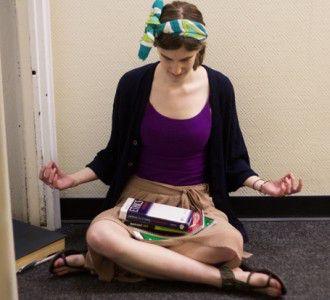
While exams have been proven to cause anxiety in students at schools such as Boston University, meditation and similar activities may help better direct attention and reduce stress, according to a study by researchers at the University of California, Santa Barbara.
“We found that mind wandering contributes to detriments across the board,” said Jonathan Schooler, one of the authors of the study and professor of psychological and brain sciences at UCSB. “We were interested in finding a technique to try to reduce that disruption.”
The study, which appeared in the March 2013 issue of Psychological Science and was reported by The New York Times Wednesday, found subjects who participated in two weeks of “mindfulness training” had improved test scores and memory capacity as well as reduced distracting thoughts.
Schooler said meditation proved helpful in allowing the study’s subjects to focus while in test-taking situations.
“It’s not just meditation, it’s the instruction and meditation practice that seems to enable people to stay more present-focused and thereby avoid their minds drifting away from the material that they’re reading,” he said.
Schooler said he hopes the research will encourage meditation, which he feels may be a very valuable technique for focus and improving academic performance. At the outset of the study, University of California students were given reading comprehension and working memory tests to document their scores and capacity, according to the study. After a program of mindfulness meditation, students who participated in the meditation scored an average of 16 percent higher on the GRE test.
“Some research has shown that mindfulness training bolsters working memory capacity and attention control, allowing for greater performance in stressful situations [such as tests],” said BU human development professor Kathleen Corriveau in an email. “Other research has shown that mindfulness training reduces anxiety in test takers, but may not influence overall score.”
Corriveau said exercises other than meditation may also help in improving results.
“Aerobic exercise with a mindful component, like yoga, has been shown to reduce anxiety and direct attention, which might help in testing situations,” she said.
Several BU students said they employ a variety of strategies to deal with exam stress and to boost focus.
Keith Congden, a College of Arts and Sciences freshman, said he uses music to clear his head before he begins studying for an exam.
“My main form [of anxiety relief] is music, so I’ll just go in my room and listen to an album for an hour,” he said. “When I listen to music, I usually try to stay away from everything else so it’s kind of like meditation to me.”
Congden said while he does feel stressed while studying, he does not let himself worry during the actual exam period.
“My philosophy has been if I’m taking a test and if it’s going poorly, I’m not going to go crazy about it because it’s going to be over soon,” he said.
College of Communication senior Sandeep Chandrasekhar said he thinks test taking causes intense stress.
“There’s a lot of anxiety going on right before a test because you feel like you want to answer everything right and you want to do well, but you end up caring a little bit too much,” he said.
He also said he believes meditation is helpful as it relaxes the mind and helps students use the information they have studied in a helpful way.
“Meditation really calms your mind, and it really helps you focus, take a step back, and make sure you remember everything you’ve been studying all along,” Chandrasekhar said.
Rebecca Long, a College of Fine Arts freshman, said while she does not know anyone who practices meditation to relieve stress, she knows many students who consume alcohol to blow off steam.
“People kind of use it [partying] as an outlet on the weekends,” she said. “They use it to get through the week.”
She said she would be less stressed if she procrastinated less, but often feels burdened by all types of schoolwork.
“It’s not just studying that stresses me out — it’s practicing and playing the viola too,” she said. “It [studying] really stresses me out because I usually wait until the last second.”




















































































































mchopra • Apr 8, 2013 at 3:23 pm
Mindfullness Based Stress Reduction (MBSR) is a bonafide and proven stress reduction method. They are practicing it in hospitals, prisons and everything in between. Today, we have scientific evidence that meditation works at the quantum level. Can your “attention” change you, and for the better? Read on: http://chopra-m.blogspot.com/2013/04/can-your-attention-change-you.html